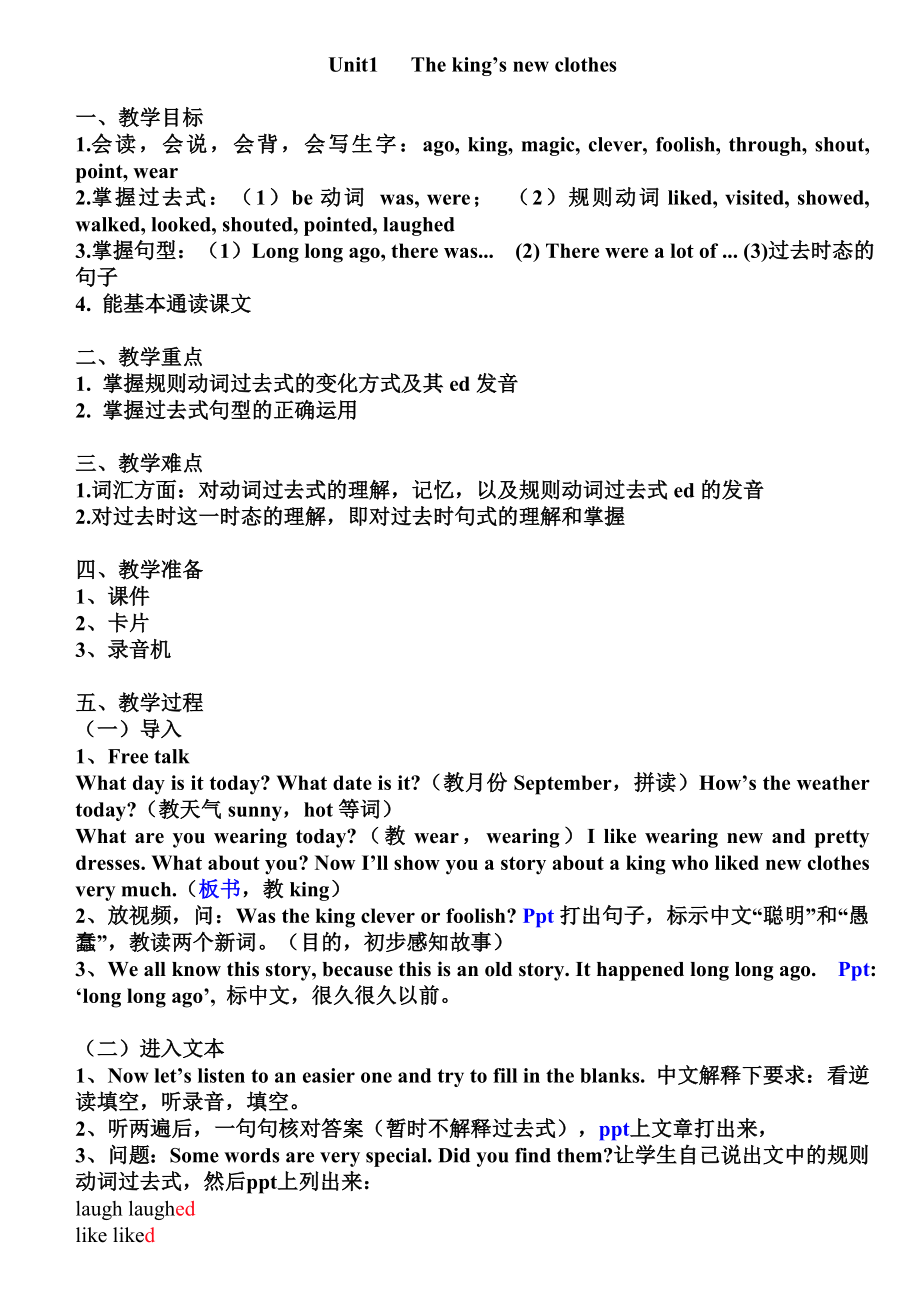《六年級(jí)上冊(cè)英語(yǔ)教案 - Unit1 The king’s new clothes譯林(三起)》由會(huì)員分享�,可在線閱讀,更多相關(guān)《六年級(jí)上冊(cè)英語(yǔ)教案 - Unit1 The king’s new clothes譯林(三起)(3頁(yè)珍藏版)》請(qǐng)?jiān)谘b配圖網(wǎng)上搜索�。
1、Unit1 The king’s new clothes
一���、 教學(xué)目標(biāo)
1. 會(huì)讀���,會(huì)說(shuō)�,會(huì)背����,會(huì)寫生字:ago, king, magic, clever, foolish, through, shout, point, wear
2. 掌握過(guò)去式:(1)be動(dòng)詞 was, were; (2)規(guī)則動(dòng)詞liked, visited, showed, walked, looked, shouted, pointed, laughed
3. 掌握句型:(1
2�、)Long long ago, there was... (2) There were a lot of ... (3)過(guò)去時(shí)態(tài)的句子
4. 能基本通讀課文
二、 教學(xué)重點(diǎn)
1. 掌握規(guī)則動(dòng)詞過(guò)去式的變化方式及其ed發(fā)音
2. 掌握過(guò)去式句型的正確運(yùn)用
三���、教學(xué)難點(diǎn)
1. 詞匯方面:對(duì)動(dòng)詞過(guò)去式的理解���,記憶,以及規(guī)則動(dòng)詞過(guò)去式ed的發(fā)音
2. 對(duì)過(guò)去時(shí)這一時(shí)態(tài)的理解��,即對(duì)過(guò)去時(shí)句式的理解和掌握
四����、教學(xué)準(zhǔn)備
1、課件
2����、卡片
3���、錄音機(jī)
五、 教學(xué)過(guò)程
(一)導(dǎo)入
1����、Free talk
What day is it today? What
3、date is it?(教月份September�,拼讀)How’s the weather today?(教天氣sunny,hot等詞)
What are you wearing today?(教wear�,wearing)I like wearing new and pretty dresses. What about you? Now I’ll show you a story about a king who liked new clothes very much.(板書,教king)
2���、 放視頻��,問(wèn):Was the king clever or foolish? Ppt打出句子,標(biāo)
4����、示中文“聰明”和“愚蠢”,教讀兩個(gè)新詞�����。(目的���,初步感知故事)
3�、 We all know this story, because this is an old story. It happened long long ago. Ppt: ‘long long ago’, 標(biāo)中文,很久很久以前��。
(二)進(jìn)入文本
1�����、Now let’s listen to an easier one and try to fill in the blanks. 中文解釋下要求:看逆讀填空���,聽(tīng)錄音�,填空��。
2�����、聽(tīng)兩遍后��,一句句核對(duì)答案(暫時(shí)不解釋過(guò)去式)��,ppt上文章打出來(lái)��,
3�����、問(wèn)題:Some
5、 words are very special. Did you find them?讓學(xué)生自己說(shuō)出文中的規(guī)則動(dòng)詞過(guò)去式���,然后ppt上列出來(lái):
laugh laughed
like liked
live lived
look looked
point pointed
shout shouted
show showed
walk walked
提醒這兩個(gè)特殊的
is was
are were
解釋一般現(xiàn)在時(shí)的概念���,動(dòng)詞的變化規(guī)則。(目的:了解規(guī)則動(dòng)詞過(guò)去式的變化方式)
4�、 問(wèn)題:它們都是加ed,那讀音是不是相同呢�����?聽(tīng)第三遍課文��,找答案
Ppt歸類講ed發(fā)音��,
6���、要先讓學(xué)生說(shuō),再歸類(這個(gè)環(huán)節(jié)目標(biāo)是講發(fā)音)
5����、You are very clever.這么快就把這么難的新知識(shí)點(diǎn)掌握了�,這樣我們就能自己來(lái)讀整個(gè)故事了���。
一幅幅出示課文圖片和句子�����,核對(duì)填空答案�,學(xué)生一句句跟讀(暫時(shí)不講中文����,僅跟讀)
讀后選擇題:
1. What did the king like? ( )
A. Beautiful clothes. B. New clothes.
2. Who visited the king? ( )
A. Two men. B. Two women.
3. Clever people (
7、) see the clothes. Foolish people ( ) see them. (clever和foolish再次教授)
A. can’t B. Can
4. The king walked through the ( ) (ppt教讀walk through)
A. town B. City
5. ( ) pointed at the king and laughed.
A. A man B. A little boy
這個(gè)環(huán)節(jié)希望學(xué)生根據(jù)文本自己理解����,并完成簡(jiǎn)單選擇題,并且在做的過(guò)程中感受過(guò)去式
8����、的用法
6、精講課文�,ppt一幅幅出示故事圖片和課文,要再打出以下生詞:
第一幅圖:long long ago, king
第二幅圖:magic�����,clever,foolish
第三幅圖:walk through, 感嘆句What beautiful clothes!
第四幅圖:point at, wear
(這個(gè)環(huán)節(jié)�,精講課文,強(qiáng)調(diào)整句的讀����,讓學(xué)生體會(huì)過(guò)去式在句子中的使用,也重視新詞的教授)
(三) 讀后鞏固
1��、True or false(書上P8)
The king liked new clothes. ______
Two men showed the kin
9��、g some magic clothes. ______
The king was foolish. ______
People could see the king’s new clothes. ______
The boy was foolish because he could not see the king’s new clothes. ______
這個(gè)環(huán)節(jié)希望學(xué)生能讀得準(zhǔn)生詞�����,理解課文�����,答得出問(wèn)題
2���、課文跟讀���,齊讀
3���、一般過(guò)去時(shí)語(yǔ)法�,總結(jié)規(guī)則動(dòng)詞過(guò)去式
一般過(guò)去時(shí)(行為動(dòng)詞型):表示過(guò)去某一時(shí)間發(fā)生的動(dòng)作
(一)動(dòng)詞過(guò)去式的規(guī)則變化:
(1)
10、 一般直接在詞尾加“ed”�。如:plant-planted visit -visited
(2) 以不發(fā)音字母“e”結(jié)尾,直接加“d”��。如:like -liked
(3) 以輔音字母加“y”結(jié)尾�,需變“y”為“i”再加“ed”。如:try -tried
(4) 有些動(dòng)詞要雙寫最后一個(gè)字母����,再加“ed”。如:stop -stopped
(二) 規(guī)則動(dòng)詞的詞尾讀音:
清輔音結(jié)尾的動(dòng)詞+ed, 發(fā)/t/
cooked coughed danced helped hoped jumped laughed liked looked par
11�、ked stopped surfed talked thanked touched walked washed watched worked asked
濁輔音和元音結(jié)尾的動(dòng)詞+ed, 發(fā)/d/
濁called cleaned climbed closed jogged joined lived loved moved opened used
元 carried cried followed glowed played showed stayed studied tried watered
以字母t或d結(jié)尾的動(dòng)
12、詞+ed, 發(fā)/id/
collected needed skated started visited wanted pointed shouted
4��、做填空練習(xí)
填一填(根據(jù)13和14頁(yè)的文本稍改)
1. is, was, were, lived, live
Long long ago, there a mountain(山). There a house on the mountain. An old man and a little boy in the house.The old man to
13���、ld(tell的過(guò)去式) the boy a story.
2. picked, lived, were, was, give, shouted , walked
Long long ago,there __________ a lion.He __________ in the forest(森林). There __________ some flowers in front of the lion’s house.One day, an old man __________ by the house.He __________ a flower. The lion
14�����、 angry. He __________ at the old man,“You picked a flower.Now __________ me your child.” The old man’s child was a beautiful girl. She __________ with the lion. The lion nice to her.One day, the lion __________ sick. The girl looked after him. Then the lion turned into a prince(王子).
 六年級(jí)上冊(cè)英語(yǔ)教案 - Unit1 The king’s new clothes譯林(三起)
六年級(jí)上冊(cè)英語(yǔ)教案 - Unit1 The king’s new clothes譯林(三起)

